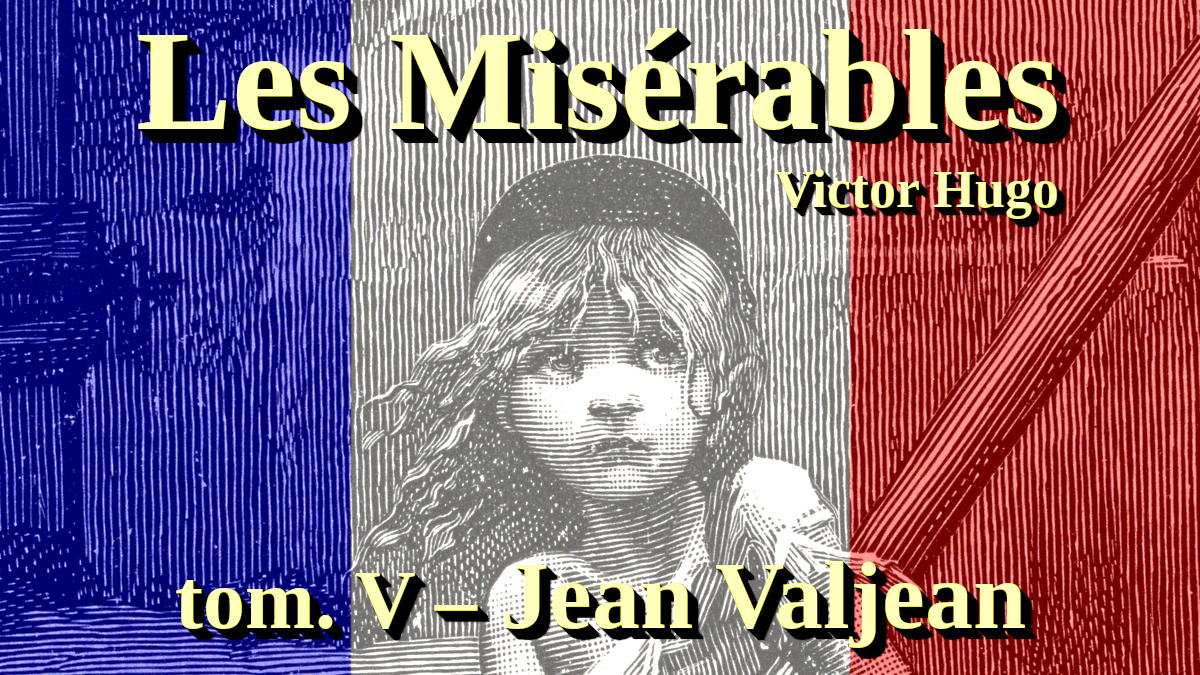Jean Valjean Takes Revenge
by Victor Hugo
translation by Lascelles Wraxall

| Sicilianu | English | Francais |
So soon as Jean Valjean was alone with Javert he undid the rope which fastened the prisoner round the waist, the knot of which was under the table. After this, he made him a signal to rise. Javert obeyed with that indefinable smile in which the supremacy of enchained authority is condensed. Jean Valjean seized Javert by the martingale, as he would have taken an ox by its halter, and dragging him after him, quitted the wine-shop slowly, for Javert, having his feet hobbled, could only take very short steps. Jean Valjean held the pistol in his hand, and they thus crossed the inner trapeze of the barricade; the insurgents, prepared for the imminent attack, turned their backs.
Marius alone, placed at the left extremity of the barricade, saw them pass. This group of the victim and the executioner was illumined by the sepulchral gleams which he had in his soul. Jean Valjean forced Javert to climb over the barricade with some difficulty, but did not loosen the cord. When they had crossed the bar, they found themselves alone in the lane, and no one could now see them, for the elbow formed by the houses hid them from the insurgents. The corpses removed from the barricade formed a horrible pile a few paces from them. Among the dead could be distinguished a livid face, dishevelled hair, a pierced hand, and a half-naked female bosom; it was Éponine. Javert looked askance at this dead girl, and said with profound calmness,--
"It seems to me I know that girl."
Then he turned to Jean Valjean, who placed the pistol under his arm, and fixed on Javert a glance which had no need of words to say, "Javert, it is I."
Javert answered, "Take your revenge."
Jean Valjean took a knife from his pocket and opened it.
"A clasp-knife," Javert exclaimed. "You are right, that suits you better."
Jean Valjean cut the martingale which Javert had round his neck, then he cut the ropes on his wrists, and stooping down, those on his feet; then rising again, he said, "You are free."
It was not easy to astonish Javert, still, master though he was of himself, he could not suppress his emotion; he stood gaping and motionless, while Jean Valjean continued,--
"I do not believe that I shall leave this place. Still, if by accident I do, I live under the name of Fauchelevent, at No. 7, Rue de l'Homme Armé."
Javert gave a tigerish frown, which opened a corner of his mouth, and muttered between his teeth,--
"Take care!"
"Begone!" said Jean Valjean.
Javert added,--
"You said Fauchelevent, Rue de l'Homme Armé?"
"No. 7."
Javert repeated in a low voice,---"No. 7."
He rebuttoned his frock-coat, restored his military stiffness between his shoulders, made a half turn, crossed his arms while supporting his chin with one of his hands, and walked off in the direction of the markets. Jean Valjean looked after him. After going a few yards Javert turned and said,--
"You annoy me. I would sooner be killed by you."
Javert did not even notice that he no longer addressed Jean Valjean with familiarity.
"Begone!" said Jean Valjean.
Javert retired slowly, and a moment after turned the corner of the Rue des Prêcheurs. When Javert had disappeared, Jean Valjean discharged the pistol in the air, and then returned to the barricade, saying,-- "It is all over."
This is what had taken place in the mean while. Marius, more occupied with the outside than the inside, had not hitherto attentively regarded the spy fastened up at the darkened end of the ground-floor room. When he saw him in the open daylight bestriding the barricade, he recognized him, and a sudden hope entered his mind. He remembered the inspector of the Rue de Pontoise, and the two pistols he had given him, which he, Marius, had employed at this very barricade, and he not only remembered his face but his name.
This recollection, however, was foggy and disturbed, like all his ideas. It was not an affirmation he made so much as a question which he asked himself. "Is that not the Police Inspector, who told me that his name was Javert?" Perhaps there was still time to intervene for this man? But first it was necessary to know if it was indeed this Javert. Marius shouted to Enjolras, who had just stationed himself at the other end of the barricade,--
"Enjolras?"
"Well?"
"What is that man's name?"
"Which man?"
"The police agent. Do you know his name?"
"Of course I do, for he told it to us."
"What is it?"
"Javert."
Marius sprang to his feet. At that moment, they heard the report of the pistol.
Jean Valjean reappeared and cried: "It is done."
notes
Hugo, Victor (1862). Les Misérables. Tome V: Jean Valjean, first book, chapter 21
translated into English by Lascelles Wraxall (1887).


